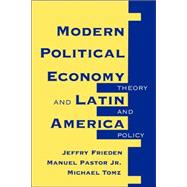
Note: Supplemental materials are not guaranteed with Rental or Used book purchases.
Purchase Benefits
What is included with this book?
|
ix | ||||
| Introduction: Modern Political Economy and the Policy Revolution in Latin America | xi | ||||
| PART ONE Theoretical Perspectives | |||||
| Section I Contending Perspectives on Market Failure and Government Failure | 3 | (32) | |||
|
5 | (5) | |||
|
|||||
|
10 | (8) | |||
|
|||||
|
18 | (6) | |||
|
|||||
|
24 | (5) | |||
|
|||||
|
29 | (6) | |||
|
|||||
| Section II Explanations of Government Policy | 35 | (60) | |||
|
37 | (7) | |||
|
|||||
|
44 | (15) | |||
|
|||||
|
59 | (12) | |||
|
|||||
|
71 | (10) | |||
|
|||||
|
|||||
|
81 | (14) | |||
|
|||||
| PART TWO Applications | |||||
| Section III The Political Economy of Growth since Independence | 95 | (58) | |||
|
97 | (13) | |||
|
|||||
|
110 | (12) | |||
|
|||||
|
122 | (12) | |||
|
|||||
|
|||||
|
134 | (6) | |||
|
|||||
|
140 | (13) | |||
|
|||||
| Section IV Foreign Trade and Industrial Policy | 153 | (40) | |||
|
155 | (10) | |||
|
|||||
|
|||||
|
165 | (8) | |||
|
|||||
|
173 | (5) | |||
|
|||||
|
178 | (8) | |||
|
|||||
|
|||||
|
186 | (7) | |||
|
|||||
| Section V Foreign Capital and the Macroeconomy | 193 | (42) | |||
|
195 | (14) | |||
|
|||||
|
|||||
|
209 | (8) | |||
|
|||||
|
217 | (7) | |||
|
|||||
|
|||||
|
|||||
|
224 | (5) | |||
|
|||||
|
|||||
|
229 | (6) | |||
|
|||||
| Section VI Political Institutions and Economic Policy | 235 | (50) | |||
|
237 | (10) | |||
|
|||||
|
247 | (14) | |||
|
|||||
|
261 | (10) | |||
|
|||||
|
271 | (5) | |||
|
|||||
|
276 | (9) | |||
|
|||||
| Section VII Social and Enviromental Issues | 285 | (46) | |||
|
287 | (11) | |||
|
298 | (9) | |||
|
307 | (6) | |||
|
|||||
|
313 | (12) | |||
|
|||||
|
325 | (6) | |||
|
|||||
|
|||||
| Acknowledgments | 331 | (2) | |||
| Index | 333 |
The New copy of this book will include any supplemental materials advertised. Please check the title of the book to determine if it should include any access cards, study guides, lab manuals, CDs, etc.
The Used, Rental and eBook copies of this book are not guaranteed to include any supplemental materials. Typically, only the book itself is included. This is true even if the title states it includes any access cards, study guides, lab manuals, CDs, etc.